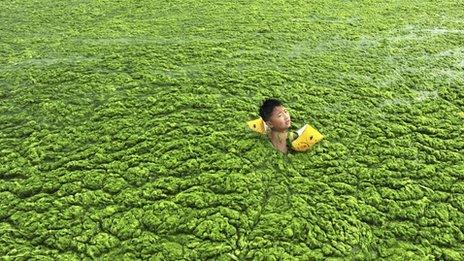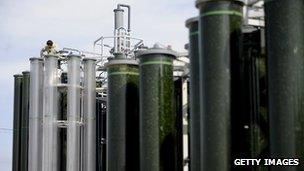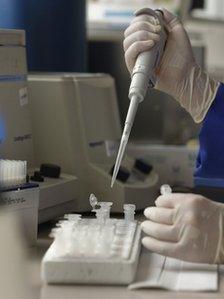Algae fuel firms face moment of truth
- Published

Algae is seven times more productive than terrestrial plants but requires a large surface area of water to grow in sufficient quantities
Something green is growing in the state of Texas.
More famous for its oil prospectors than green entrepreneurs, it is home to a surprisingly large conurbation of algae start-ups.
They are part of the latest generation of firms trying to solve the problems that have prevented algae making any meaningful contribution to the world's energy needs.
Algae fuel is based on technologies which seek to use algae or bacteria to produce fuels by combining light, carbon dioxide, water and nutrients through photosynthesis.
It is a dream which has arisen every time the oil price has spiked.
Following pioneering research during the 1950s and 60s in places such as Berkeley, University of California, the US Aquatic Species Program was launched by President Jimmy Carter in 1978.
The hope then, as now, was to use fast-growing, simple plant organisms to produce vast quantities of transport fuels.
That programme slowly fizzled out, culminating in a report in 1998 which concluded that the price of oil needed to be far higher than the then $15-20 a barrel to make algae viable.
By 2007, with the oil price well north of $100, interest in algae had risen again.
"On paper, it's seven times more productive than terrestrial plants, it grows faster and the amount of oil exceeds that in terrestrial plants," says Adam Powell from the University of Swansea in Wales, which is backing a European research and development project, Enalgae.
Scaling up
That sort of logic, and laboratory experiments backing it up, saw a rash of start-ups around the world - and especially in the US - seeking venture capital funding based on promises of limitless, cheap, clean fuel.

Algae are grown in tubes to increase the surface area open to sunlight
But none has yet succeeded in producing fuel commercially and at scale.
Instead, many firms have shut down.
In 2009, MIT spin-off Greenfuel Technologies closed after $70m (£44m) of investment to build its own mini-algae plant.
"No-one knows how to grow any kind of micro-organism at very large scale - multiple hectares," says Prof Jerry Brand from the University of Texas in Austin, which is leading research in the field.
"As you scale up, it's not that things get cheaper, but that new problems emerge."
One problem is that despite being very small, you can't actually grow algae very densely. The algae closest to the light - or the surface of the water - block the light for algae lower down.
Another is harvesting the green gloop, or the oil it produces.
Ben Graziano is technology commercialisation manager at the UK's Carbon Trust and was in charge of the algae programme before it was scrapped as part of the government's spending cuts.
"You need to find ways to harvest those particular strains that produce oil, and it so happens that those are quite challenging to harvest," he explains.
Both of these make scaling up more difficult than many first thought.
Currently, he says, only around 20,000 tonnes of algae are produced a year. To make any impact, it would need to be millions of tonnes.
And algae's own mixed history has left the sector short on expertise.
"There are probably only 10, maybe 20, people who know how to do it and you've got to go up from there," Mr Graziano says.
Constant sunshine
In the US, research is focused around the north-east, California and Texas.
The University of Texas has curated one of the largest collections of algae in the world, with more than 3,000 strains.
That, combined with the constant sunshine and plentiful local sources of carbon dioxide and dirty, brackish water have attracted firms trying to solve the seemingly intractable problems algae pose.

One firm is genetically engineering micro-organisms to excrete fuel
One is AlgaEternal, which has set up its pilot on the university campus.
The pilot consists of 120, 12ft-high tubes designed to make growing the algae more efficient than using shallow ponds.
It isn't the only pilot of its kind - but given its high cost the idea depends on preventing contamination of the system.
In the past, as Mr Graziano puts it, scientists have "woken up one morning, gone to the farm and discovered their whole system has crashed and they can't clean the tubes, and at that point you see a few bankruptcies".
Another start-up, OpenAlgae, is also working with the university on a method of cost-effectively extracting the oil.
But out of town, a test site has been set up for a slightly different solution, employing something which isn't technically algae at all - blue-green algae or cyanobacteria.
Massachusetts-based Joule Unlimited claims that by genetically engineering the micro-organism to excrete fuel, it can avoid many of the problems that have bedevilled its rivals.
"Rather than using sunlight and then water to grow up organisms which we can then harvest, we are engineering our organisms with pathways that are specific for the molecules of interest. In the case of alkanes we are making a diesel-like mixture of hydrocarbons," says Dan Robertson, the firm's senior vice-president of biology.
The company, which is opening a second, larger, test site in Hobbs, New Mexico, says it eventually hopes to produce fuel at the equivalent oil cost of $50 a barrel - about half the current price of oil.
Ultimately, the firm, like others, will be judged on its results.
"Right now there are lots of people scaling up and growing different types of algae in the US," says Prof Peter Nixon from Imperial College London.
"This is the year when they'll work out the sums - either these companies will make money or they'll go under."
Roman baths
In the UK, much of the research is focused on reducing the cost of algae and finding other uses beyond transport fuels.
At the University of Bath, Prof Roderick Scott is working on a programme which uses waste water to lower the cost of producing fuel from algae.
"We are very interested in using waste streams of various kinds, waste CO2 which is in abundance and which gives you [carbon] credits, and waste water which contains, depending on where its from, reasonably good levels of nitrates and phosphates," he says.
The university is working with UK start-up Aragreen on the project, hoping to benefit from support for cleaning water and removing CO2.
Prof Scott's team is also examining the local Roman baths for a possible solution to another problem faced by algae entrepreneurs - the fact that algae perform quite badly when hot.
They have identified the algae which live in the baths and are testing to see if they are productive enough to produce fuel.
But ultimately, success for algae in the short term may lie in the other, higher value, goods that can be produced from algae.
One firm, Martek, has succeeded by producing key oils involved in baby food formula.
Others are targeting the burgeoning field of nutraceuticals.
"We'll see a lot of people moving into earlier, higher-value markets like proteins, fish oils, colourants and dyes," says Mr Graziano.